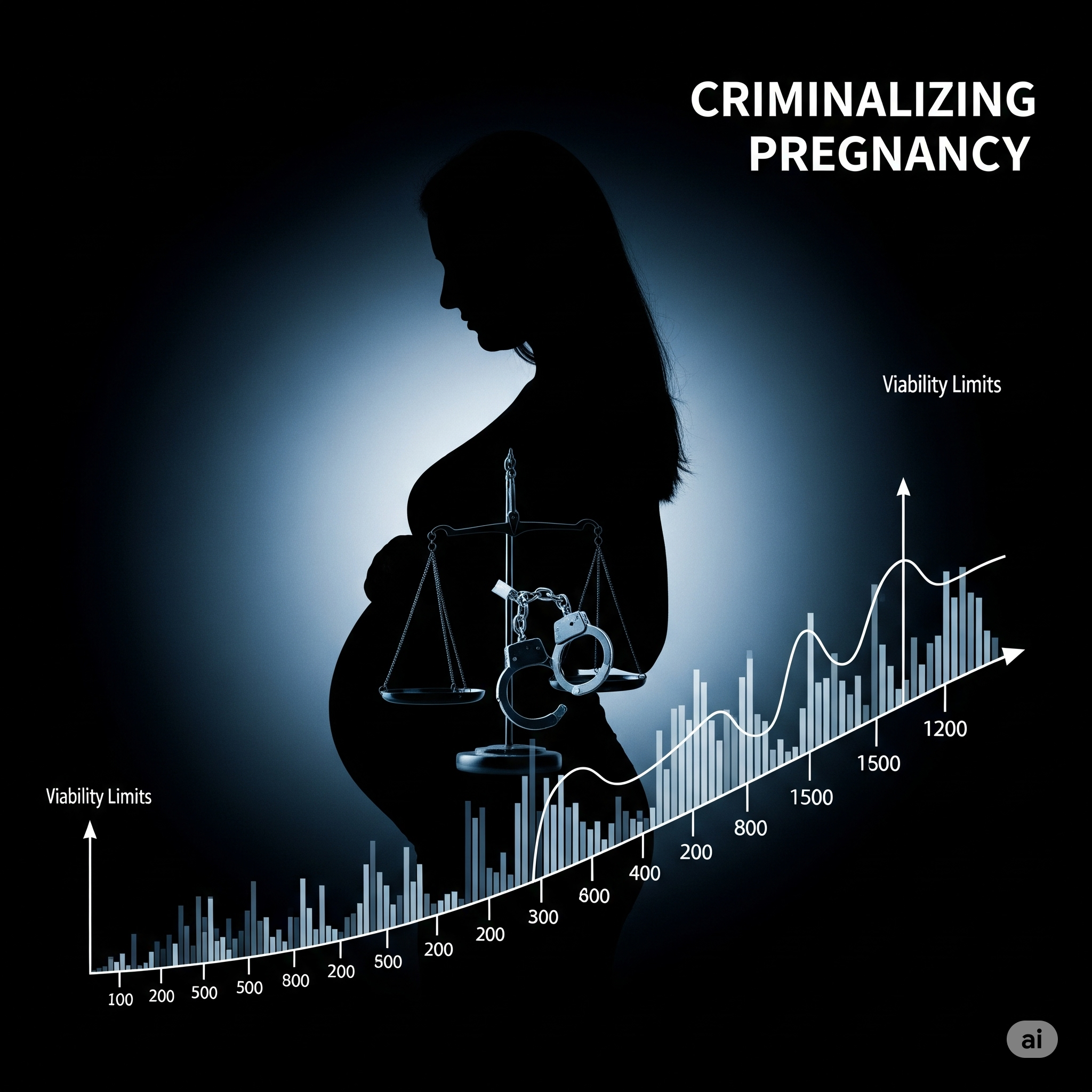How Viability Limits Are Accidentally Criminalizing Pregnancy
This blog post explores how state-level "viability limits" inadvertently create "soft fetal personhood," leading to the criminalization of pregnancy, particularly affecting poor women and women of color.

When Karen Thompson stepped into her role as Legal Director at Pregnancy Justice a year and a half ago, she brought with her two decades of experience in the criminal justice system, including pivotal work with organizations like the Innocence Project and the ACLU of New Jersey. While initially immersing herself in the nuances of reproductive justice, Thompson quickly recognized alarming parallels between her past focus and the escalating criminalization of pregnancy and abortion in the post-Roe v. Wade era. Her insights reveal a critical, often overlooked, facet of the current legal landscape: how "viability limits" inadvertently contribute to this dangerous trend.
Viability limits refer to the point in a pregnancy—typically around 22-24 weeks—when a fetus is considered capable of surviving outside the womb. Thompson argues that by enshrining these limits into state laws or even constitutional amendments, advocates, perhaps unwittingly, establish a concept of "soft fetal personhood." This legal demarcation, she explains, draws an artificial line where an abortion suddenly becomes "bad," allowing the government to assert an interest in the fetus that can potentially supersede the fundamental rights and bodily autonomy of the pregnant individual.
The consequences of this "soft fetal personhood" are profound and far-reaching in practice. This legal framework provides a pathway for law enforcement and state authorities to investigate and, in some cases, prosecute individuals for actions perceived as harming a fetus deemed "viable." This can extend to cases involving drug use during pregnancy, and chillingly, even to tragic outcomes such as miscarriages and stillbirths. Thompson's work at Pregnancy Justice highlights that this criminalization disproportionately targets and punishes poor women, with a stark racial disparity where white women are more often prosecuted in drug-related cases, while Black and brown women face a higher likelihood of prosecution following pregnancy loss.
With the overturning of Roe v. Wade, the protective federal umbrella against state interference in reproductive decisions has vanished. This makes state-level viability limits even more perilous. They empower governmental bodies to intrude upon deeply personal medical and life decisions, often driven by moral or religious beliefs rather than medical necessity or individual autonomy. Thompson underscores that without federal safeguards, the battle for reproductive freedom increasingly hinges on challenging these state-level concepts that pave the way for criminalizing pregnancy itself.
Understanding the insidious link between viability limits and the criminalization of pregnancy is crucial for anyone involved in reproductive justice advocacy or criminal justice reform. As Karen Thompson illuminates, ensuring true reproductive freedom requires not only access to abortion but also comprehensive protections against the state's overreach into the private lives and bodies of pregnant individuals, safeguarding them from becoming subjects of criminal investigation for their pregnancy outcomes.
How Viability Limits Are Criminalizing Pregnancy: A Reproductive Justice Warning
The legal landscape surrounding reproductive rights in the United States has undergone seismic shifts, and at the heart of the ongoing battle is a concept that, while seemingly benign, is increasingly being leveraged to criminalize pregnancy: viability limits. Karen Thompson, the legal director at Pregnancy Justice, brings a sharp perspective to this issue, drawing on her two decades of experience in the criminal justice system to highlight the alarming parallels between traditional incarceration and the growing trend of prosecuting pregnant individuals.
Viability limits typically define a point in pregnancy—often between 22 and 24 weeks—when a fetus is considered capable of surviving outside the womb. While these limits were once a cornerstone of abortion rights discussions, Thompson argues that their recent enshrinement in state constitutions, often by reproductive rights advocates themselves, has inadvertently created a dangerous precedent: "soft fetal personhood." This legal demarcation, she explains, implies a point at which abortion becomes "bad" and the government gains a vested interest in the fetus, potentially overriding the pregnant person's fundamental rights.
The consequences of this "soft fetal personhood" are far-reaching and deeply concerning. Law enforcement agencies are increasingly using these legal frameworks to investigate and punish individuals for actions perceived as harming a viable fetus. This includes cases involving drug use during pregnancy, but extends even to tragic outcomes like miscarriages and stillbirths, where individuals are subjected to scrutiny and potential criminal charges.
Thompson's background, including her work at the Innocence Project and the ACLU of New Jersey, has equipped her to recognize the systemic injustices at play. She emphasizes that this criminalization disproportionately affects vulnerable populations. While white women may be targeted in drug-related cases, Black and brown women are disproportionately subjected to investigations and charges related to pregnancy loss, revealing a stark racial bias within the system.
With the overturning of Roe v. Wade, federal protections for abortion rights are gone, leaving states free to legislate on pregnancy with unprecedented authority. This makes state-level viability limits even more perilous, as they provide a legal foundation for governmental interference driven by personal or religious beliefs, further eroding bodily autonomy and reproductive freedom. The work of organizations like Pregnancy Justice, and the insights of experts like Karen Thompson, are crucial in exposing how these seemingly technical legal definitions are, in practice, leading to the criminalization of pregnancy itself.
